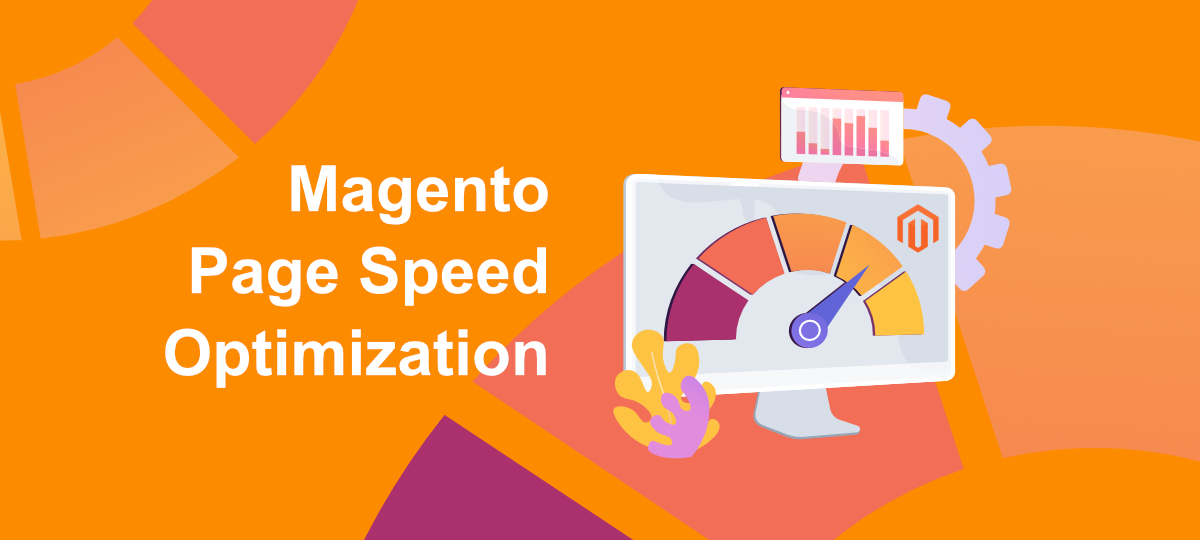- Pick a Reliable Hosting Service
- Upgrade Your Package And Database
- Use the Latest Magento Version
- Eliminate Built-in Cache
- Utilize Varnish Cache
- Activate Magento Flat Catalogs
- Update Your Indexes
- Check On Third-party Modules
- Product Image Optimization
- Minification of JavaScript and CSS
- Activate GZIP Compression
- Cleanse Your Database Logs
- Integrate CDN
- Use Production Mode
- Use Advanced JavaScript Bundling
- Get Instant Results WIth Elasticsearch
- Utilize Next-gen File Format
- Shift to HTTP/2
- Enable Caching
- Redis Configuration
Numerous online businesses use Magento 2 as their trusted eCommerce platform. There are several reasons for choosing Magento as your eCommerce platform. It is robust, equipped with many advanced capabilities, and can support businesses of all sizes.
But the truth is that even a powerful eCommerce platform like Magento can become slow if you leave it unchecked. Online businesses must run the page speed optimization process regularly to ensure the site’s consistent performance.
Here, we discuss everything you need to know about Magento speed optimization and how you can ensure the best performance of your Magento store.
Introduction to Magento Speed Optimization
Magento offers one of the most robust eCommerce platforms in the market today. But even a powerful eCommerce platform like Magento can become slow and interfere with the user experience if you leave it unchecked. Magento speed optimization is essential for ensuring a high conversion rate and ranking on Google results pages.
You can ensure high load speed for your Magento store in several ways. Ideally, you need an optimized Magento installation to ensure that your online store runs seamlessly from the beginning itself. It means you must pay attention to every aspect of the Magento installation process, including the following.
- Installation of third-party modules and identifying potential troubleshoots
- Enabling full-page cache and ensuring their integrity
- Minification of CSS and JS
- Providing the fastest hosting service for your online store
Why Does Magento Speed Matter?
The success of eCommerce is primarily because of the convenience it can offer to consumers. With an eCommerce store, you don’t have to wait for a shopkeeper or cashier to check out products and make a purchase. Slow website loading can take away this advantage and hurt user experience.
According to a recent research, your online store’s load speed should be between 0 to 4 seconds. Moreover, the study also found that the conversion rate significantly depends on the first five seconds of the page-load time. Modern consumers have a wide range of options available for their shopping needs, especially regarding eCommerce.
That’s not all. A slow-loading website will likely need higher SERP rankings. Page load speed is one of the most important factors that decide your SERP ranking, which is valid for all search engines, including Google. It is also worth noting that the Magento 2 platform is even more powerful and delivers excellent speed if you optimize it.

How Does Magento Website Performance Impacts Business Success?
The performance of your Magento store can have a significant impact on the success of your business. eCommerce giant Amazon found that additional time for loading causes a decline in revenue.
For an eCommerce company the size of Amazon, it could mean a loss of millions of dollars. That’s not all. Some aspects of your online business you can influence via Magento website performance are as follows.
- Traffic: Magento website performance optimization ensures that your website can handle many visitors or traffic without slowing down.
- Unique Visitors: Website performance is essential to attracting unique visitors within a specific time, regardless of the path they take to arrive on your site.
- Page Impression: Magento performance optimization can help you boost page impressions, which is the overall number of website visits.
- Conversion Rate: Performance optimization allows your online store to load faster and better serve customers. It effectively increases the conversion rate of your store.
- Bounce Rate: Slow-loading websites often see high bounce rates. With Magento optimization, you can efficiently minimize bounce rate due to a slow-loading website.
How to Test Magento Website Performance?
The best way to ensure your Magento website performance is auto the mark is to test the site speed. It is typically the first step in evaluating your website and understanding how severe your problem is with website performance.
Moreover, the testing is not a one-time process where you can test it once and get it over with because the testing should be continuous and regular. You can incorporate testing as an integral part of your maintenance cycle and ensure your Magento store is up to speed.
Testing Magento website performance is relatively easy as you can quickly do it with a third-party solution. Google PageSpeed Insights, GTmetrix, Pingdom Tools, etc., are some of the most popular tools you can use to test your website speed.
Magento Speed Optimization Tips
Ensuring the top-tier performance of your Magento website takes work, and sometimes it may seem too challenging. There is no shortcut to speed up your Magento website. However, we can give you some valuable tips that can optimize the speed and performance of your Magento store.
1. Pick a Reliable Hosting Service
One requirement for a fast-loading Magento website is to pick a reliable hosting service. Your Magento store is only as powerful as the hosting service you choose. The experts at Rainmaker.UNO can help you assess your Magento store and its compatibility with your hosting service.
Start by assessing your existing hosting service. You can also list the pros and cons of the hosting to evaluate your situation better. Use this list to assess whether the hosting service can effectively meet your business needs. Moreover, you must also ensure that the hosting service also meets the Magento system requirements.
2. Upgrade Your Package And Database
Make it a point to upgrade your Magento package to the premium version. Magento upgrades allow you to enhance the performance and capabilities of your eCommerce store. Similarly, you must constantly update your database to serve your customers better. It enables you to do more on your eCommerce store and scale up your operations.
3. Use the Latest Magento Version
Always ensure that you keep your Magento store up to date to access the latest features and capabilities from Magento. The update can also help you fix bugs and keep them away, significantly affecting your website’s performance.
Some updates may bring in some significant changes to your online store. So, make sure you take the necessary backups before updating your Magento store. For instance, the update from Magento 1 to Magento 2 made some significant changes to the eCommerce platform.
4. Eliminate Built-in Cache
Magento speed optimization and performance enhancement are significant concerns for Magento store owners. Businesses often integrate numerous technologies with your Magento store, which can lead to many built-in caches.
You can use distributed memory caches to enhance your Magento store’s loading speed. In addition to that, you can also use dynamic databases to boost your website’s performance. By doing so, you are effectively minimizing database requests and freeing up your servers.
5. Utilize Varnish Cache
One of the best things about Magento 2 is that it has an excellent built-in cache, which offers a response time of 0.5 seconds. With Varnish, your Magento store can support Full Page Cache natively. It is worth noting that Magento 2 has a built-in Varnish solution.
The solution offers you better performance for your eCommerce store and gives you visible results. And unlike the previous versions, you no longer have to install modules to integrate Varnish with your Magento store.

6. Activate Magento Flat Catalogs
All the data in your Magento store go to Magento’s database, which is similar to an excel file. Whenever the data stored exceeds a specific limit, your Magento store can get slower due to spilled data.
One of the best ways to minimize the effect of this “spilled” data is to activate the Magento Flat Catalog category. It enables your Magento store to generate flat tables and update them for each indexation.
7. Update Your Indexes
One of the most significant benefits of using Magento’s eCommerce platform is its ability to work with bulk data. What is impressive is that Magento still manages to reduce the load time despite dealing with bulk data.
Magento’s eCommerce platform accomplishes this by reindexing the indexers. It is essential to know this because Magento provides an update for its indexers during core system updates. The problem is that you must update the indexers manually to ensure a smooth user experience.
8. Check On Third-party Modules
One of the best practices that every Magento store owner must follow is to check on their third-party modules. Consider running a full audit to assess your third-party integrations. You can do this by turning off each Magento module.
Once you turn it off, you can clear the cache and check whether it significantly affected your Magento website performance. Make sure to include all your CMS pages in this test, including home and product pages.
9. Product Image Optimization
The product images play a significant role in your Magento speed optimization effort. If you use large-size image files in your Magento site, your site gets slower. It is crucial to have good-quality images. But, you do not have to use ultra HD and big-size images.
The key is to find the sweet spot where the image size is consistent with the image quality and the load speed. Moreover, image optimization can also have a significant impact on your SEO rankings. Our SEO experts can help you with image optimization.
10. Minification of JavaScript and CSS
Minification of CSS and Javascript can help you enhance your Magento website performance. It can reduce your site’s load time and boost overall website performance. In most cases, the browser only requires sending two requests simultaneously instead of sending numerous requests. And the best part is that you can minify CSS/JS from your Magento admin panel.

11. Activate GZIP Compression
Enabling GZIP Compression is an efficient way to ensure that the content on your Magento store loads faster. More often than not, Magento stores handle numerous requests simultaneously, affecting your load time.
Using GZIP Compression also lets you minimize the bandwidth usage of your Magento store. By enabling GZIP Compression, you can effectively reduce the time necessary for your site to download page files and speed up the browsing experience.
12. Cleanse Your Database Logs
Magento has one of the best database management capabilities in an eCommerce platform. It also has one of the best performance benchmarks. However, it still needs improvement in some aspects. One of the aspects Magento needs to catch up on when it comes to database management is the space it allows the logs. You can significantly improve your Magento website speed and performance by cleansing it.
Pro Tip: Always back up the logs before clearing them or making significant changes to your database.
13. Integrate CDN (Content Delivery Network)
As you know, a CDN or Content Delivery Network in your Magento store caches any static content you use. The cache can include images, fonts, videos, CSS, JavaScript, and more.
Such extensive cache data can often lead to slower response time for your Magento store without proper CDN integration. Hence, it is always advisable to integrate an advanced CDN to ensure a faster, more streamlined shopping experience for your customers.
14. Use Production Mode
Magento 2 brought so many changes to the eCommerce platform that developers are still learning new things daily. Moreover, any changes you make to the Magento store can have a long overreaching impact that you may need to realize.
Hence, it is always best to use the Production Mdoe for your Magento store until you are thoroughly familiar with the system. It would be best to switch to the live environment only when you are sure you can handle the live environment safely.
Moreover, Magento’s Production Mode is ideal for ensuring an optimized performance, effectively enhancing the user experience.
15. Use Advanced JavaScript Bundling
You can effectively minimize the number of server requests using advanced JavaScript bundling solutions. The solution loads all the necessary bundles for each page the user loads on your Magento website. Since the browser caches these bundles, your site loads faster.
The JS bundling also allows you to minimize the HTTP request on your Magento store and reduce the JS file size. But you do the same with a standard JS bundling. The advanced JS bundling is different because it eliminates the need to load every bundle the browser requests.

16. Get Instant Results WIth Elasticsearch
With Elasticsearch, you get the advanced full-text searching capability. The best part is that the searches happen at a significantly high speed. The advanced search capability allows the user to find whatever they are looking for quickly.
The advanced search capability benefits Magento store owners who sell a wide range of products. You can use Elaticsearch to ensure users find relevant results on your Magento store and its catalog pages. It is worth noting that the latest versions of Magento come with pre-enabled Elasticsearch.
17. Utilize Next-gen File Format
As you know, the images on your Magento store can take up a significant amount of space. Furthermore, it is one of the most influential factors in determining your website load speed. One of the ways you can optimize the use of images in your store is to use lazy loading for pictures.
However, you need more than lazy loading to get the desired results. Consider reducing the image size using WebP images to boost your site speed without compromising the image quality. WebP images is a next-gen format from Google that works seamlessly on most browsers.
18. Shift to HTTP/2
With HTTP/2, you can get faster load time for your Magento store. It is faster than HTTP/1 and offers easy connections for your static files. And the best part is that HTTP/2 can do it simultaneously for all your files.
In other words, HTTP/2 can process several of your static files in a single connection. HTTP/1 takes time to build one link after the other to process your static files. As a result, you can ensure that your Magento store has faster loading and rendering time.
19. Enable Caching
We know the servers load your website’s content and display it to the user whenever they navigate to a webpage for the first time. You may not know that Magento automatically makes a copy of the page and caches its content.
The next time the user visits (re)visits your website, the server can generate the page faster using the cache. There are situations when the developers have to disable the cache to work on the website. So, ensure you always enable caching in your Magento store for faster load time.
20. Redis Configuration
Redis is another cache solution that’s very similar to the Varnish cache. Both solutions are equally popular among Magento store owners. Redis is a tool that lets you save sessions and individual session data.
Redis gives you faster access to user data, statuses, credentials, and more. It is also worth noting that the tools use a distributed data storage system. Redis does not require constant access to the disc, enhancing your Magento website speed.
Magento Speed Optimization Extensions
The advantage of building your eCommerce store on Magento is the availability of advanced extensions. You can use relevant Magento extensions to speed up your online store and ensure a memorable customer experience. Here is a list of a few of the best Magento speed optimization extensions you can use for your website.

Magento 2 Page Speed Optimization Extension (Weltpixel)
WeltPixel brings you one of the best Magento speed optimization extensions in the market. It allows you to implement advanced JS bundling for your Magento store, effectively minimizing your page size and load time.
The tool can also help you get higher Google Page Speed Insights scores and boost your overall SEO ranking. Besides that, you also get access to free lifetime updates and one month’s free support, which you can choose to extend if necessary.
Magento 2 Accelerated Mobile Pages (Plumrocket)
Magento 2 AMP or Accelerated Mobile Pages is an advanced Magento speed optimization extension from Plumrocket. It is an open-source project and focuses on making your mobile pages load faster.
The open-source nature makes the AMP friendly for most Magento stores without needing third-party service. It is also worth noting that the extension minimizes HTTP requests and automatically generates Google AMP pages. As a result, the extension ensures faster loading of your Magento store.
Magento 2 Rocket JavaScript/Deferred JavaScript (Magefan)
It is the best Magento extension to enable deferred JavaScript for your Magento store. The extension allows you to automatically move all the JS code to the bottom of the page. The Magento extension can also optimize your JS bundle to ensure a faster loading time. It minimizes the JS bundle size and effectively reduces the loading time for your website.
Google Page Speed Optimizer (Amasty)
With Google Page Speed Optimizer from Amasty, you can enter the green zone without needing custom development. It enables you to improve your Magento store performance and even meet the requirements put forward by Google. An optimized code structure allows the Magento extension to improve page speed performance and minimize load time.
Cron Scheduler (KiwiCommerce)
Cron Scheduler by KiwiCommerce is another excellent choice for Magento speed optimization. It enables you to create Cron jobs depending on your specific business requirements. The tools also come with a Cron job management capability. It means you can create and remove Cron jobs per your convenience and business requirements.
Need for Magento Page Speed Optimization Services
Magento page speed optimization is crucial to running your online business on Magento’s eCommerce platform. The good news is that Magento offers a robust platform to meet all your business needs. However, you need to optimize its speed and performance to ensure it provides the best service to your customers.
No matter how robust your eCommerce store is or how big an offer you are providing the customer, your website must be fast. The customer immediately leaves your website because they can quickly find a different seller online. With our Magento speed optimization service, you can ensure that your Magento store is ready to serve your customers.

Moreover, our SEO experts can optimize your Magento store to perform better for customers and search engines. Our Magento speed optimization process involves a holistic approach that optimizes all aspects of your online store, from images to meta descriptions. As a result, we can ensure a high conversion rate for your Magento store.
Summary - Hire Experts for Magento Page Speed Optimization
Hiring an expert for your Magento speed optimization is essential for online businesses. Magento offers one of the most advanced eCommerce platforms and numerous out-of-the-box capabilities. However, maintaining a Magento store and implementing custom features and capabilities can be challenging.
Even a harmless integration can slow down your Magento store if you do not know what you are doing. Rainmaker.UNO can make sure this does not happen to your online business. We have a team of Magento and SEO experts specializing in Magento speed optimization. We take care of everything from your website images to interactions and optimize your store for faster load time.
We conduct a holistic analysis of your Magento store, determine issues in your online store, and rectify the problem. Our experts can also help you pick the most appropriate Magento speed optimization plan depending on your unique business requirements. Moreover, our Magento experts are always a call away to serve you whenever you need our help.
Magento Page Speed Optimization - Frequently Asked Questions (FAQs)
Your online store will eventually slow down unless you run a comprehensive Magento speed optimization process for your online store. With a slow Magento store, more and more customers will navigate away from your store, reducing your conversion rate. Moreover, a slow website can also impact your SEO rankings and, eventually, your overall revenue.
One of the most significant benefits of Magento speed optimization is improved website traffic. With a faster-loading website, more people can simultaneously access your website without delays. It ensures your landing pages for specific marketing campaigns load faster without making the customer wait or giving them a chance to close the window.
Yes, you can improve the number of unique visitors to your online store with Magento speed optimization. A fast-loading website can attract and retain visitors from different paths. The traffic you bring in organically or via paid ads tends to spend more time on the website when the site loads faster, ultimately resulting in more unique visitors.
Yes, you can enhance the conversion rate for your business using Magento speed optimization. Our advanced performance optimization enables your store to provide a seamless and memorable user experience. As a result, the customer can quickly and efficiently browse through products, add them to the cart, and secure checkout on your online store.
Magento speed optimization can significantly impact your bounce rate. One of the most common reasons customers close a window is the slow loading of the website. With Magento speed and performance optimization, you can ensure that your website loads within a matter of seconds. It gives less reason for the customer to navigate away from your store.
There are several ways you can test your Magento store. Testing can help you understand how fast your website is and how well it can perform for the user. You can use a third-party application like Google PageSpeed Insights to test your Magento store. But, a better option would be to let an expert like Rainmaker.UNO to test and optimize your Magento store.
Several third-party tools or applications can help you test your Magento store’s speed and performance. The most popular choices of tools for testing your Magento store include Google PageSpeed Insights, GTmetrix, Pingdom Tools, etc. However, it is best to seek the help of an expert like Rainmaker.UNO to thoroughly analyze your store.
Your Magento store may not perform up to the mark because of the hosting service you use. The only way to know for sure is to conduct a detailed analysis of your Magento store. The experts at Rainmaker.UNO can help you with this. We can run multiple tests to determine what is lowering your store’s loading speed.
You only need a premium or enterprise version of Magento to speed up your site speed if yours is an enterprise-level business. More often than not, the Magento store slows down because of a need for more optimization. The experts at Rainmaker.UNO can help you assess the issues causing your website to slow down and rectify them.
Although not mandatory, you should always use the latest Magento version available. There are several reasons for this, and high-loading speed is only one. Magento is always looking to make its eCommerce platform better and faster. Hence, every time you miss a significant update, you run the risk of a slow website.
Most third-party extensions or modules refrain from interfering with your Magento store and its daily operations. However, integrations are complex, and if they don’t work well with each other and your website, it can lead to some problems, including slow load time. You need our experts to ensure that your extensions don’t interfere with your website speed.
Using high-definition images in your Magento store is fine as long as the file size is within the allowable limit. Large-size images can often slow down the load time for your Magneto store, and low-quality images can harm your brand perception. The key is to strike a balance between the size and quality of the photos, and our experts can help you.
Magento speed optimization can help you improve your Google pr SEO rankings. One of the critical aspects Google and other search engines consider when ranking websites is their loading speed. Rainmaker.UNO can help you optimize your Magento store’s speed and performance, which can help you significantly in improving your Google ranking.
